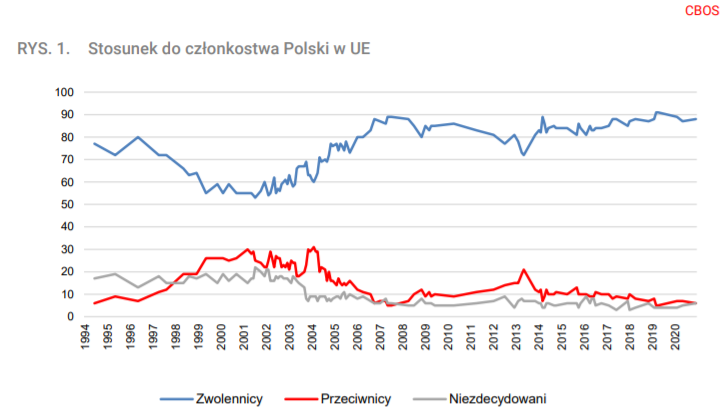Almost one fifth of Poles favour their country leaving the European Union, the highest proportion recorded since soon after Poland joined the bloc in 2004, according to a new poll.
The finding comes amid a renewed clash between Warsaw and Brussels over the rule of law, with some legal scholars arguing that the government’s actions have effectively placed Poland outside the European legal order and opposition figures warning that it will lead to a “Polexit” from the EU.
However, other longer-term polling has shown that support for the EU has been rising in Poland, and all surveys show that a large majority favour remaining in the bloc.
The new poll, which was conducted by SW Research for the Rzeczpospolita daily, found that 17% of respondents answered positively when asked: “In your opinion, should Poland leave the EU?” Another 62.2% responded negatively and just over 20% did not have an opinion.
Those most likely to oppose leaving the EU were people aged 50+ as well as those with a higher level of education. Men (22%) were far keener on Polexit than women (12%).
The new findings mark a notable jump compared with surveys conducted by a number of pollsters at the end of last year, when Poland threatened to veto the EU budget.
In another poll for Rzeczpospolita, conducted by IBRiS in November, only 11% of respondents said they supported leaving the EU. One by Kantar for TVN, Poland’s largest private broadcaster, found 8% support for Polexit. A December survey by IPSOS for OKO.press found 7%.
In regular polling by CBOS, a state research agency, support among Poles for EU membership has not dropped below 70% since 2005. Since the current ruling Law and Justice (PiS) party came to power in 2015, the figure has risen, passing 90% in 2019 and remaining at 88% at the end of 2020.
Various polling has also found that most Poles see the national-conservative government’s judicial policies as an attempt to violate the rule of law and support the EU’s intervention over the issue.

Support for (blue line) and opposition to (red line) Poland’s members of the EU (CBOS, “Polacy o warunkowości w budżecie UE“, 2020)
PiS has itself insisted that it supports continued EU membership, with the prime minister, Mateusz Morawiecki, saying last month that there is “no risk of Polexit” and that the government has no intention of pursuing it. He accused the opposition of trying to stoke “political emotions” by arguing otherwise.
A number of senior officials have, however, criticised the EU, accusing it of seeking to undermine Polish sovereignty and remove the PiS government. “This is Poland, not the EU,” declared the PiS speaker of parliament last month.
Zbigniew Ziobro, the justice minister, in May accused Brussels of having a “colonial” attitude towards Poland. The same month, the education minister, Przemysław Czarnek, announced that Polish schools would teach that the EU “is an unlawful entity”.
Main image credit: Dawid Żuchowicz/Agencja Gazeta

Maria Wilczek is deputy editor of Notes from Poland. She is a regular writer for The Times, The Economist and Al Jazeera English, and has also featured in Foreign Policy, Politico Europe, The Spectator and Gazeta Wyborcza.




















